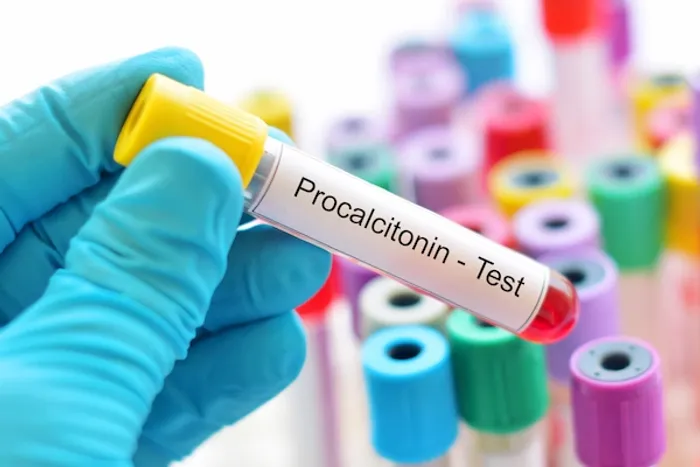Procalcitonin Blood Test Overview and Interpretation
Learn what the Procalcitonin (PCT) blood test is, why it’s done, how it helps detect bacterial infections like sepsis, and how to interpret your results for better treatment decisions.

Written by Dr. M L Ezhilarasan
Reviewed by Dr. D Bhanu Prakash MBBS, AFIH, Advanced certificate in critical care medicine, Fellowship in critical care medicine
Last updated on 29th Aug, 2025

If you or a loved one has been advised to take a Procalcitonin (PCT) blood test, you might wonder what it is and why it’s needed. This article will help you understand the test, its purpose, and what the results mean in a simple and friendly way.
What is a Procalcitonin Blood Test?
The Procalcitonin (PCT) test is a blood test that helps doctors determine if you have a bacterial infection and how severe it might be. Unlike other tests that check for general infections, PCT is more specific to bacterial infections, making it a useful tool for diagnosis and treatment.
Why is This Test Done?
Doctors may recommend a PCT test if they suspect:
- A serious bacterial infection (like sepsis).
- A respiratory infection (such as pneumonia).
- To monitor how well antibiotics are working.
To reduce unnecessary antibiotic use (since PCT levels help decide if antibiotics are needed).
Symptoms That May Lead to a PCT Test
If you have signs of a severe infection, your doctor might order this test. Common symptoms include:
- High fever or chills
- Rapid heartbeat
- Difficulty breathing
- Confusion or dizziness
- Extreme fatigue
- Low blood pressure
How is the Test Done?
The PCT test is a simple blood draw, usually from a vein in your arm. It takes just a few minutes, and no special preparation is needed (like fasting).
Understanding Your Procalcitonin Test Results
The results are measured in nanograms per millilitre (ng/mL). Here’s what they generally mean:
- Below 0.10 ng/mL → Low risk of a severe bacterial infection.
- 0.10 0.25 ng/mL → Possible infection, but not severe.
- 0.25 0.50 ng/mL → Moderate risk of bacterial infection.
- Above 0.50 ng/mL → High likelihood of a serious bacterial infection (like sepsis).
Note: Higher PCT levels usually mean a more severe infection. Your doctor will interpret the results along with your symptoms and other tests.
Consult an Specialist for the best advice
How Does This Affect Your Health?
- Early Detection: Helps doctors identify bacterial infections quickly, leading to faster treatment.
- Avoiding Unnecessary Antibiotics: If PCT is low, doctors may avoid prescribing antibiotics unless necessary.
- Monitoring Treatment: If you’re already on antibiotics, the test can show if they’re working.
Tips for Managing Infections
If you have a bacterial infection, follow these steps for better recovery:
1. Take Prescribed Antibiotics – Complete the full course, even if you feel better.
2. Stay Hydrated – Drink plenty of water to help your body fight infection.
3. Rest Well – Your body needs energy to heal.
4. Eat Nutritious Foods – Focus on fruits, vegetables, and proteins to boost immunity.
5. Monitor Symptoms – If fever or other symptoms worsen, contact your doctor immediately.
When to See a Doctor?
If you experience:
- Persistent high fever
- Severe weakness or confusion
- Difficulty breathing
- Rapid heart rate
- Unusual pain or swelling
Seek medical help right away, as these could be signs of a serious infection.
Book a Procalcitonin Test with Apollo 24|7
If your doctor has recommended a Procalcitonin test, you can easily book it through Apollo 24|7. A quick blood test can provide crucial information about your health and guide the right treatment.
Get Your Health Assessed
Final Thoughts
The Procalcitonin test is a valuable tool in detecting bacterial infections early and ensuring proper treatment. If you have symptoms of a severe infection, don’t ignore them; consult your doctor and get tested if needed. Early diagnosis and treatment can make a big difference in your recovery.
Consult an Specialist for the best advice
Consult an Specialist for the best advice

Dr. Syed Ismail Ali
General Practitioner
7 Years • MBBS
Hyderabad
Apollo 24|7 Clinic, Hyderabad

Dr. M L Ezhilarasan
General Practitioner
6 Years • MBBS
Visakhapatnam
Apollo 24|7 Clinic - Andhra Pradesh, Visakhapatnam

Dr D M Karthik
General Practitioner
4 Years • MBBS, Fellowship in Diabetes Mellitus, Advance certificate in Diabetes Mellitus, Derma Nutrition Certification
Visakhapatnam
Apollo 24|7 Clinic - Andhra Pradesh, Visakhapatnam

Dr. Jawwad Mohammed Kaleem
General Practitioner
4 Years • MBBS
Hyderabad
Apollo 24|7 Clinic, Hyderabad

Dr. Chaithra H
General Physician/ Internal Medicine Specialist
6 Years • MBBS, MD General Medicine, DNB General Medicine
Bangalore
Apollo 24|7 Clinic - Karnataka, Bangalore
Consult an Specialist for the best advice

Dr. Syed Ismail Ali
General Practitioner
7 Years • MBBS
Hyderabad
Apollo 24|7 Clinic, Hyderabad

Dr. M L Ezhilarasan
General Practitioner
6 Years • MBBS
Visakhapatnam
Apollo 24|7 Clinic - Andhra Pradesh, Visakhapatnam

Dr D M Karthik
General Practitioner
4 Years • MBBS, Fellowship in Diabetes Mellitus, Advance certificate in Diabetes Mellitus, Derma Nutrition Certification
Visakhapatnam
Apollo 24|7 Clinic - Andhra Pradesh, Visakhapatnam

Dr. Jawwad Mohammed Kaleem
General Practitioner
4 Years • MBBS
Hyderabad
Apollo 24|7 Clinic, Hyderabad

Dr. Chaithra H
General Physician/ Internal Medicine Specialist
6 Years • MBBS, MD General Medicine, DNB General Medicine
Bangalore
Apollo 24|7 Clinic - Karnataka, Bangalore

